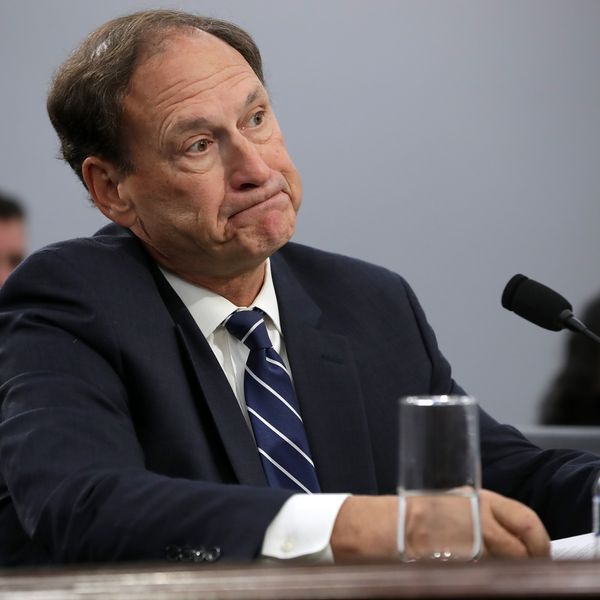SCOTUS to Rule on 'Textbook Example' of Racist Gerrymandering
A federal court ruled earlier this year that the 2011 redistricting did constitute racially-motivated gerrymandering and ordered the lines to be redrawn, though voters challenged the new districts as well.
The U.S. Supreme Court announced Monday that it will soon weigh in on whether North Carolina's redistricting relied too heavily on race, deliberately clustering large populations of black voters into two districts in an attempt to diminish their influence and sway election results.
The Hill reports:
North Carolina citizens bringing the case forward argued that the redrawn lines were a "textbook example of racial gerrymandering" that violated the equal protection clause of the 14th Amendment.
They claimed North Carolina lawmakers packed black voters from "disparate black communities" into the 1st Congressional District and 12th Congressional District.
A federal court ruled earlier this year that the 2011 redistricting did constitute racially motivated gerrymandering and ordered the lines to be redrawn, though voters challenged the new districts as well. According to Politico's Josh Gerstein, "The latest revision of the map is expected to preserve a 10-to-3 Republican-Democratic split in the state's U.S. House delegation."
Nonetheless, North Carolina Republican Gov. Patrick McCrory and the state Board of Elections petitioned the Supreme Court to weigh in on the lower court ruling, claiming that "the trial court's finding of racial gerrymandering was based on erroneous fact-finding," Courthouse News Service reports.
As the Supreme Court will now consider the case when it reconvenes this fall, the maps will unlikely change before November's presidential election.
North Carolina's voter suppression efforts have come under increased scrutiny since the passage in 2013 of House Bill 589, which eliminated same-day registration, required strict forms of voter ID, and shortened the early voting period, among other things. Citing the widespread disenfranchisement caused by these and other new voting restrictions, voting rights advocates across the nation are pressuring federal lawmakers to restore the 1965 Voting Rights Act before the upcoming election.
An Urgent Message From Our Co-Founder
Dear Common Dreams reader, The U.S. is on a fast track to authoritarianism like nothing I've ever seen. Meanwhile, corporate news outlets are utterly capitulating to Trump, twisting their coverage to avoid drawing his ire while lining up to stuff cash in his pockets. That's why I believe that Common Dreams is doing the best and most consequential reporting that we've ever done. Our small but mighty team is a progressive reporting powerhouse, covering the news every day that the corporate media never will. Our mission has always been simple: To inform. To inspire. And to ignite change for the common good. Now here's the key piece that I want all our readers to understand: None of this would be possible without your financial support. That's not just some fundraising cliche. It's the absolute and literal truth. We don't accept corporate advertising and never will. We don't have a paywall because we don't think people should be blocked from critical news based on their ability to pay. Everything we do is funded by the donations of readers like you. Will you donate now to help power the nonprofit, independent reporting of Common Dreams? Thank you for being a vital member of our community. Together, we can keep independent journalism alive when it’s needed most. - Craig Brown, Co-founder |
The U.S. Supreme Court announced Monday that it will soon weigh in on whether North Carolina's redistricting relied too heavily on race, deliberately clustering large populations of black voters into two districts in an attempt to diminish their influence and sway election results.
The Hill reports:
North Carolina citizens bringing the case forward argued that the redrawn lines were a "textbook example of racial gerrymandering" that violated the equal protection clause of the 14th Amendment.
They claimed North Carolina lawmakers packed black voters from "disparate black communities" into the 1st Congressional District and 12th Congressional District.
A federal court ruled earlier this year that the 2011 redistricting did constitute racially motivated gerrymandering and ordered the lines to be redrawn, though voters challenged the new districts as well. According to Politico's Josh Gerstein, "The latest revision of the map is expected to preserve a 10-to-3 Republican-Democratic split in the state's U.S. House delegation."
Nonetheless, North Carolina Republican Gov. Patrick McCrory and the state Board of Elections petitioned the Supreme Court to weigh in on the lower court ruling, claiming that "the trial court's finding of racial gerrymandering was based on erroneous fact-finding," Courthouse News Service reports.
As the Supreme Court will now consider the case when it reconvenes this fall, the maps will unlikely change before November's presidential election.
North Carolina's voter suppression efforts have come under increased scrutiny since the passage in 2013 of House Bill 589, which eliminated same-day registration, required strict forms of voter ID, and shortened the early voting period, among other things. Citing the widespread disenfranchisement caused by these and other new voting restrictions, voting rights advocates across the nation are pressuring federal lawmakers to restore the 1965 Voting Rights Act before the upcoming election.
The U.S. Supreme Court announced Monday that it will soon weigh in on whether North Carolina's redistricting relied too heavily on race, deliberately clustering large populations of black voters into two districts in an attempt to diminish their influence and sway election results.
The Hill reports:
North Carolina citizens bringing the case forward argued that the redrawn lines were a "textbook example of racial gerrymandering" that violated the equal protection clause of the 14th Amendment.
They claimed North Carolina lawmakers packed black voters from "disparate black communities" into the 1st Congressional District and 12th Congressional District.
A federal court ruled earlier this year that the 2011 redistricting did constitute racially motivated gerrymandering and ordered the lines to be redrawn, though voters challenged the new districts as well. According to Politico's Josh Gerstein, "The latest revision of the map is expected to preserve a 10-to-3 Republican-Democratic split in the state's U.S. House delegation."
Nonetheless, North Carolina Republican Gov. Patrick McCrory and the state Board of Elections petitioned the Supreme Court to weigh in on the lower court ruling, claiming that "the trial court's finding of racial gerrymandering was based on erroneous fact-finding," Courthouse News Service reports.
As the Supreme Court will now consider the case when it reconvenes this fall, the maps will unlikely change before November's presidential election.
North Carolina's voter suppression efforts have come under increased scrutiny since the passage in 2013 of House Bill 589, which eliminated same-day registration, required strict forms of voter ID, and shortened the early voting period, among other things. Citing the widespread disenfranchisement caused by these and other new voting restrictions, voting rights advocates across the nation are pressuring federal lawmakers to restore the 1965 Voting Rights Act before the upcoming election.

